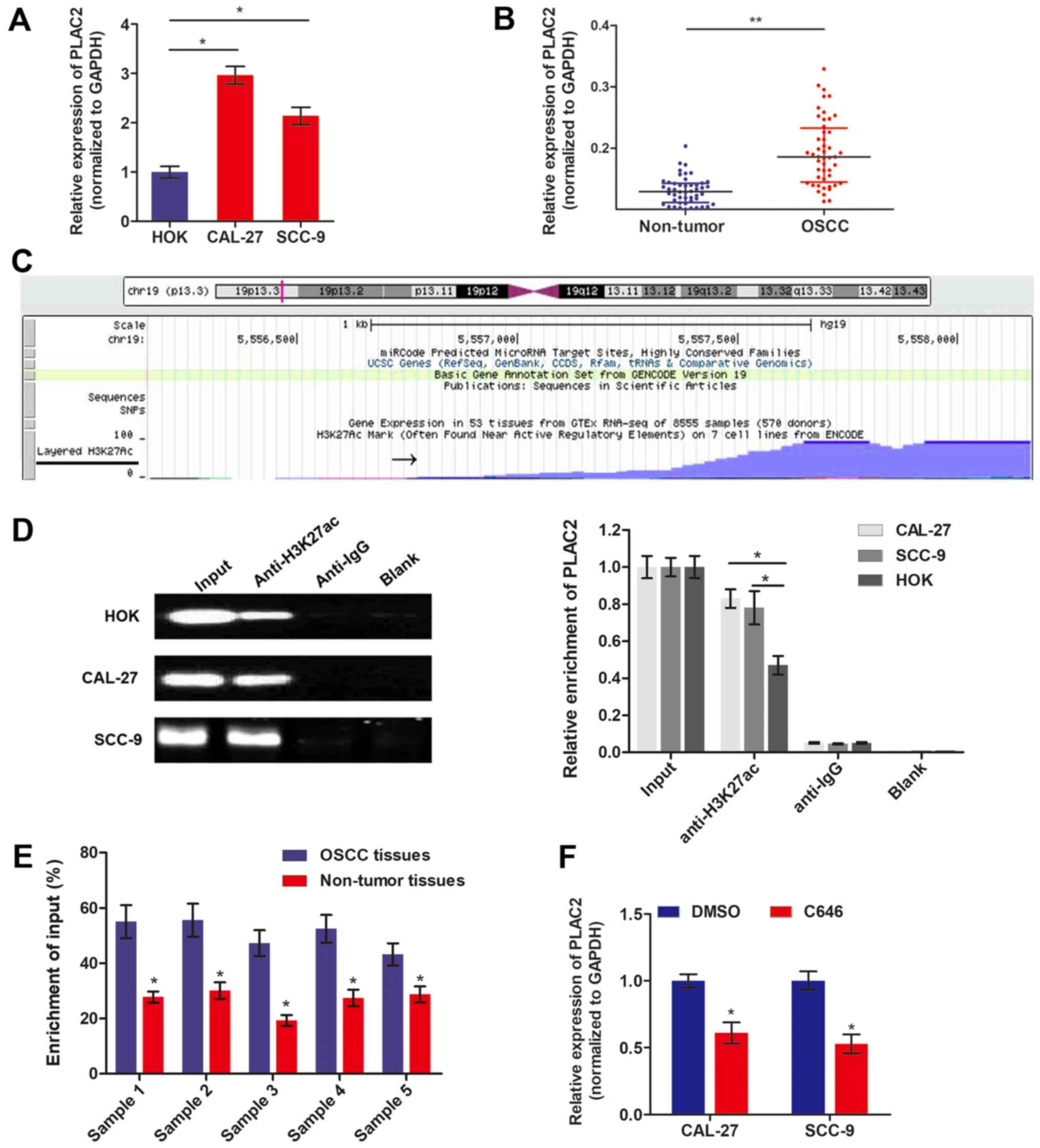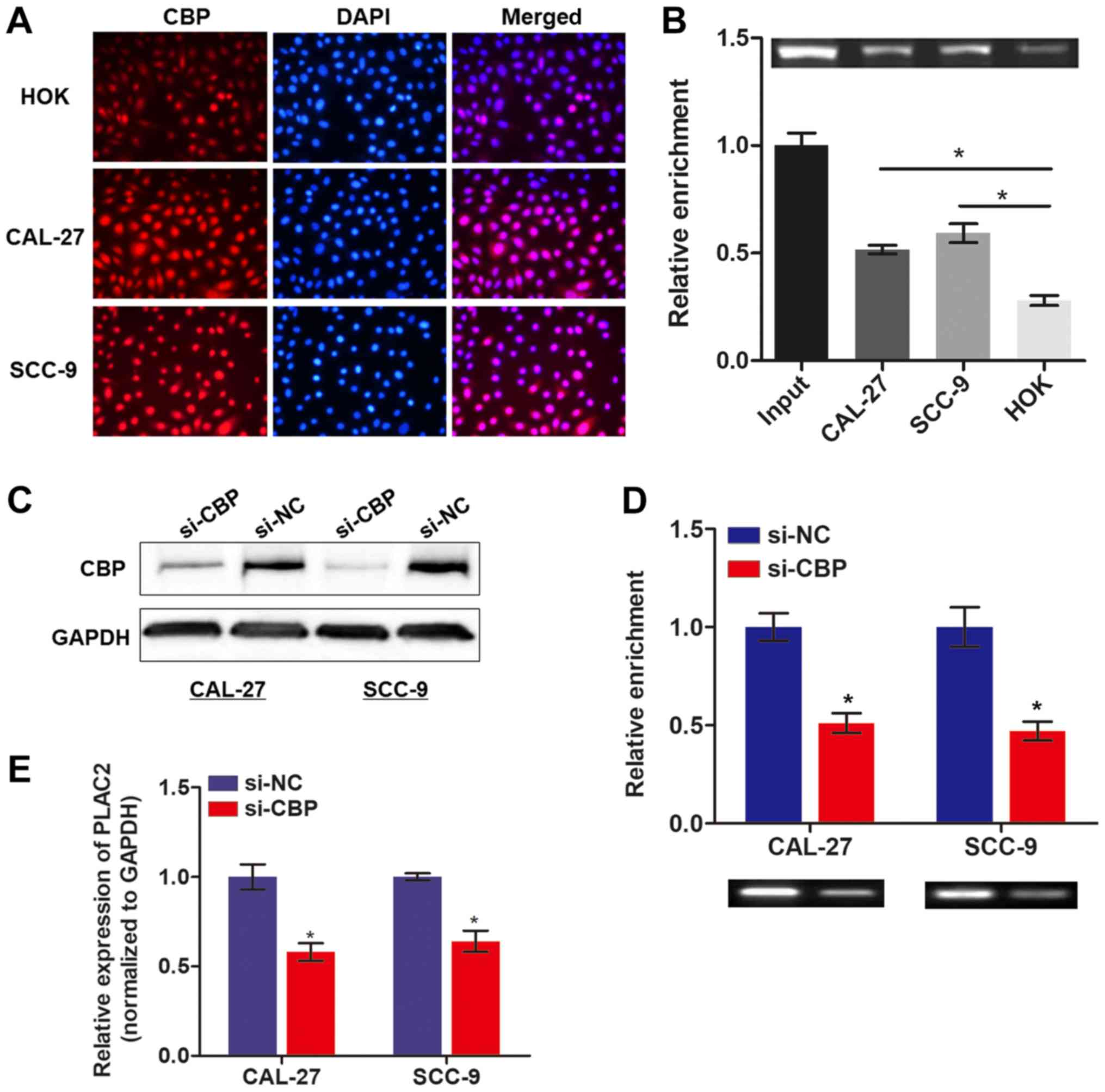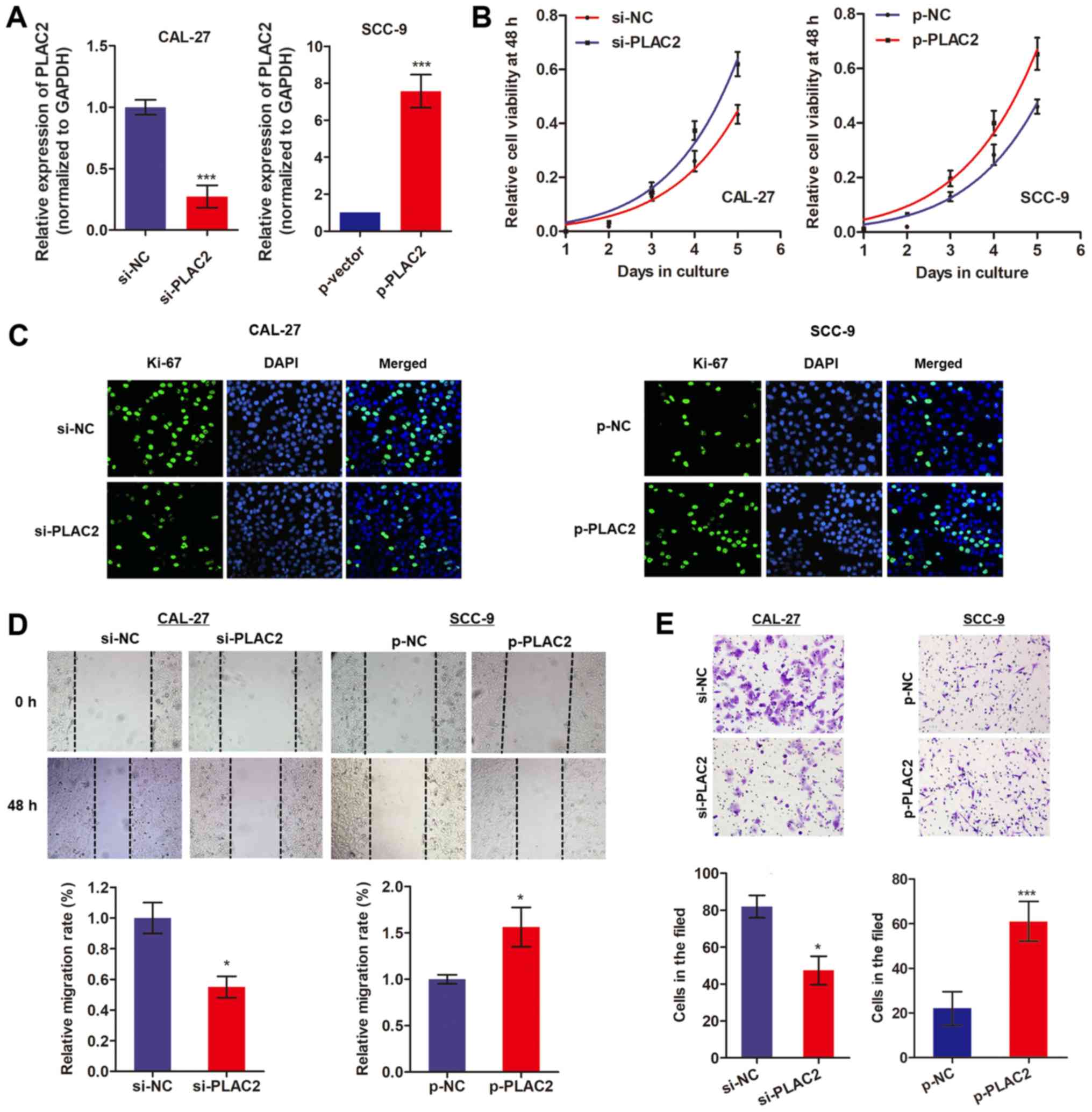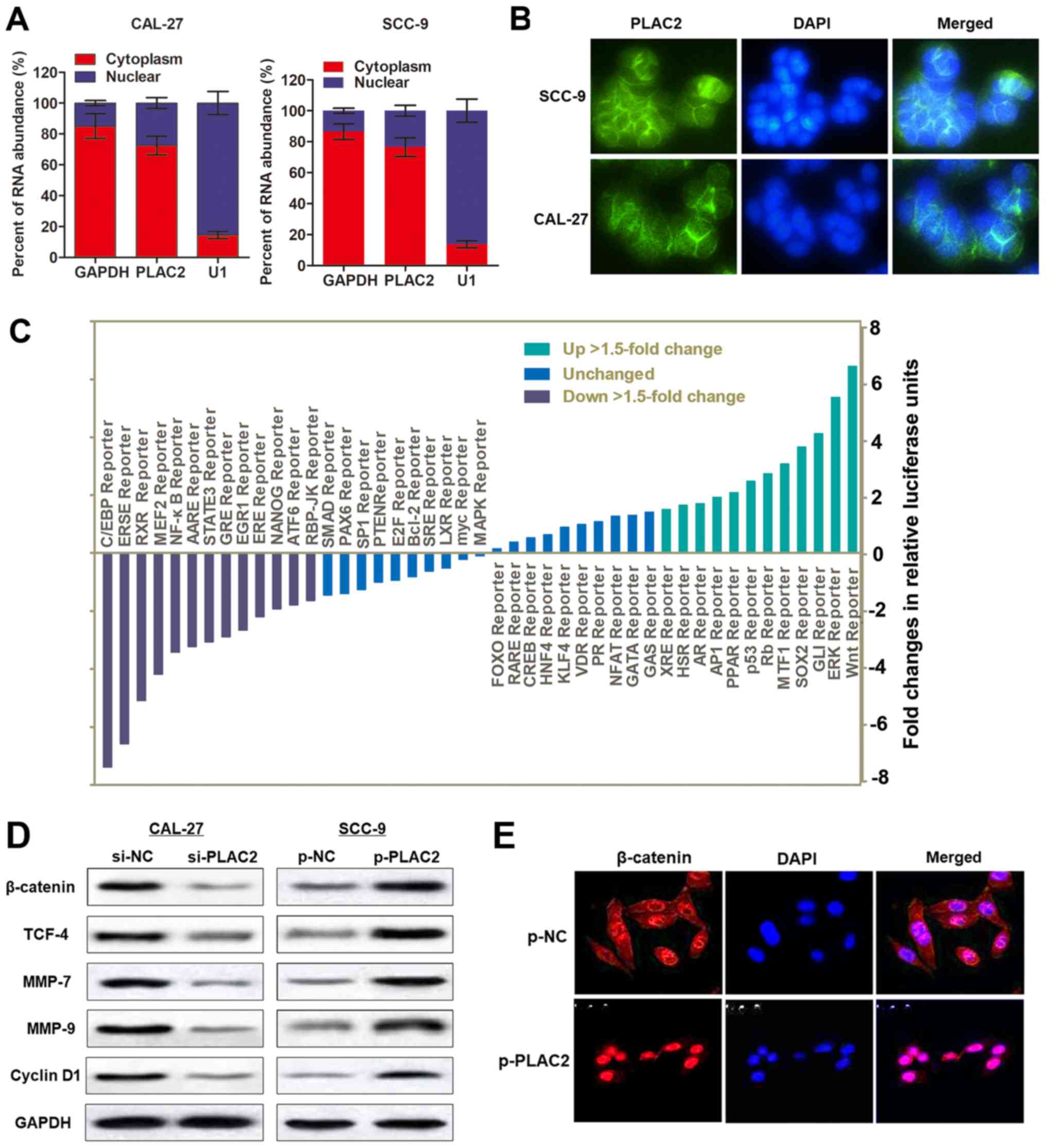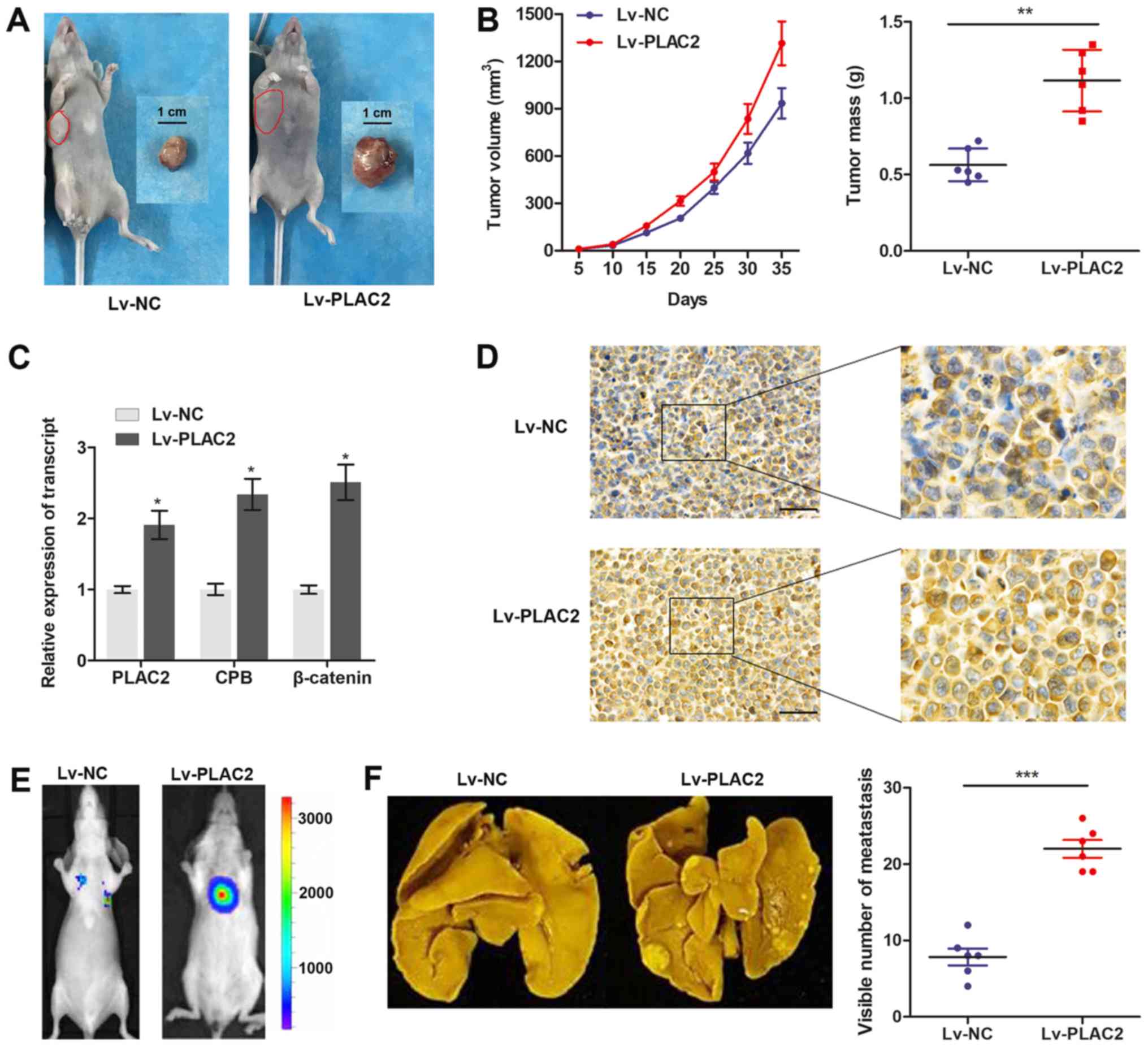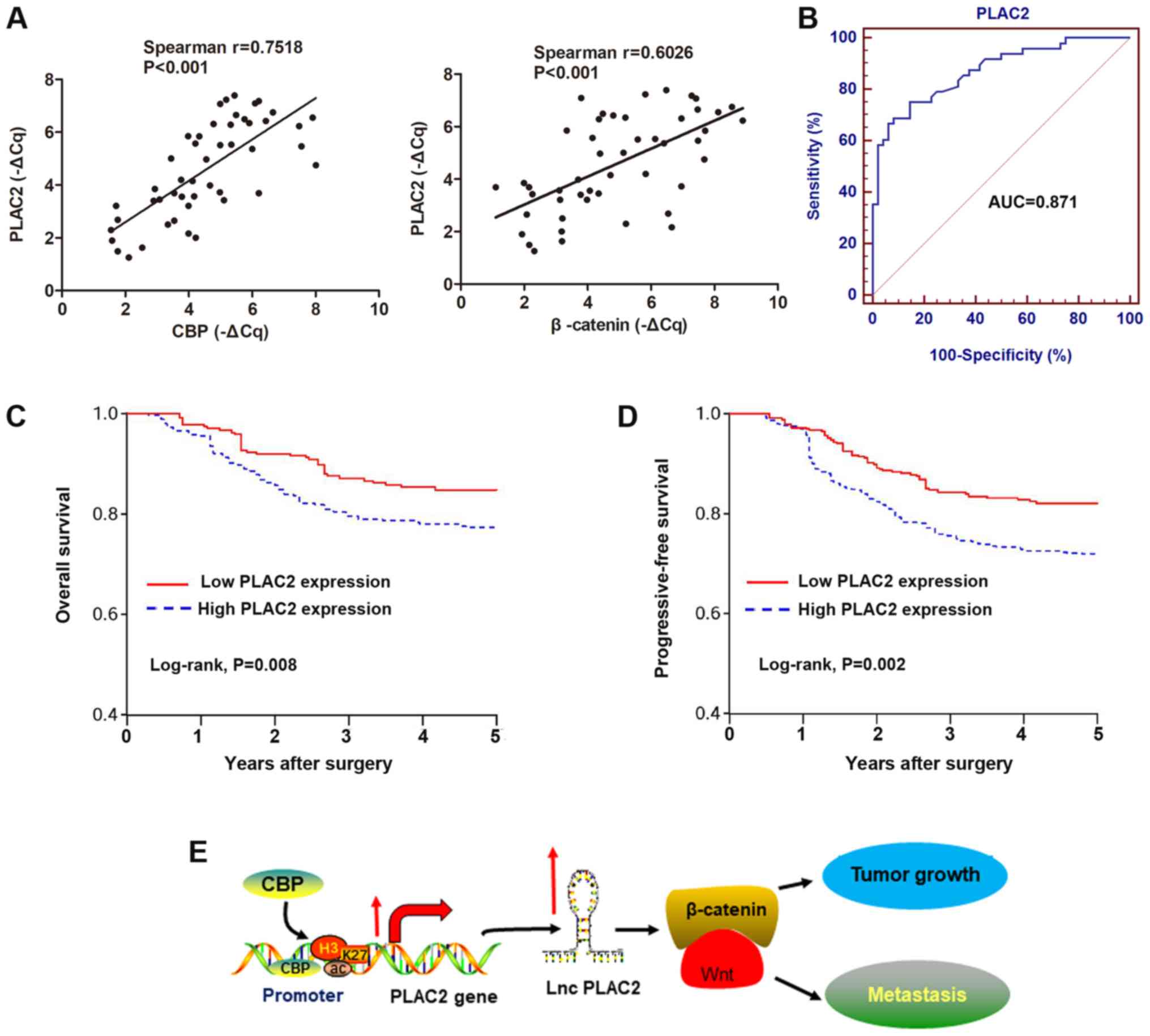|
1
|
Binmadi NO and Basile JR: Perineural
invasion in oral squamous cell carcinoma: A discussion of
significance and review of the literature. Oral Oncol.
47:1005–1010. 2011. View Article : Google Scholar : PubMed/NCBI
|
|
2
|
Yan L, Chen F, Liu F, Qiu Y, Wang J, Wu J,
Bao X, Hu Z, Peng X, Lin X, et al: Differences in modifiable
factors of oral squamous cell carcinoma in the upper and lower of
oral fissure. Oncotarget. 8:75094–75101. 2017. View Article : Google Scholar : PubMed/NCBI
|
|
3
|
Glazer CA, Chang SS, Ha PK and Califano
JA: Applying the molecular biology and epigenetics of head and neck
cancer in everyday clinical practice. Oral Oncol. 45:440–446. 2009.
View Article : Google Scholar
|
|
4
|
Loewen G, Jayawickramarajah J, Zhuo Y and
Shan B: Functions of lncRNA HOTAIR in lung cancer. J Hematol Oncol.
7:902014. View Article : Google Scholar : PubMed/NCBI
|
|
5
|
Nishizawa Y, Konno M, Asai A, Koseki J,
Kawamoto K, Miyoshi N, Takahashi H, Nishida N, Haraguchi N, Sakai
D, et al: Hypoxia stimulates the cytoplasmic localization of
oncogenic long noncoding RNA LINC00152 in colorectal cancer. Int J
Oncol. 52:453–460. 2018.PubMed/NCBI
|
|
6
|
Zhang W, Cai X, Yu J, Lu X, Qian Q and
Qian W: Exosome-mediated transfer of lncRNA RP11 838N2.4 promotes
erlotinib resistance in non-small cell lung cancer. Int J Oncol.
53:527–538. 2018.PubMed/NCBI
|
|
7
|
Zhang X, Feng W, Zhang J, Ge L, Zhang Y,
Jiang X, Peng W, Wang D, Gong A and Xu M: Long non coding RNA PVT1
promotes epithelial mesenchymal transition via the TGF β/Smad
pathway in pancreatic cancer cells. Oncol Rep. 40:1093–1102.
2018.PubMed/NCBI
|
|
8
|
Han P, Li JW, Zhang BM, Lv JC, Li YM, Gu
XY, Yu ZW, Jia YH, Bai XF, Li L, et al: The lncRNA CRNDE promotes
colorectal cancer cell proliferation and chemoresistance via
miR-181a-5p-mediated regulation of Wnt/β-catenin signaling. Mol
Cancer. 16:92017. View Article : Google Scholar
|
|
9
|
Bassett AR, Akhtar A, Barlow DP, Bird AP,
Brockdorff N, Duboule D, Ephrussi A, Ferguson-Smith AC, Gingeras
TR, Haerty W, et al: Considerations when investigating lncRNA
function in vivo. eLife. 3:e030582014. View Article : Google Scholar : PubMed/NCBI
|
|
10
|
Wapinski O and Chang HY: Long noncoding
RNAs and human disease. Trends Cell Biol. 21:354–361. 2011.
View Article : Google Scholar : PubMed/NCBI
|
|
11
|
Hu YW, Kang CM, Zhao JJ, Nie Y, Zheng L,
Li HX, Li X, Wang Q and Qiu YR: LncRNA PLAC2 down-regulates RPL36
expression and blocks cell cycle progression in glioma through a
mechanism involving STAT1. J Cell Mol Med. 22:497–510. 2018.
View Article : Google Scholar
|
|
12
|
Kretz M: TINCR, staufen1, and cellular
differentiation. RNA Biol. 10:1597–1601. 2013. View Article : Google Scholar : PubMed/NCBI
|
|
13
|
Wang S, Zang C, Xiao T, Fan J, Mei S, Qin
Q, Wu Q, Li X, Xu K, He HH, et al: Modeling cis-regulation with a
compendium of genome-wide histone H3K27ac profiles. Genome Res.
26:1417–1429. 2016. View Article : Google Scholar : PubMed/NCBI
|
|
14
|
Zubritskiy A and Medvedeva YA: DNA
sequence features in the establishing of H3K27ac. F1000 Res.
7:1652018. View Article : Google Scholar
|
|
15
|
Creyghton MP, Cheng AW, Welstead GG,
Kooistra T, Carey BW, Steine EJ, Hanna J, Lodato MA, Frampton GM,
Sharp PA, et al: Histone H3K27ac separates active from poised
enhancers and predicts developmental state. Proc Natl Acad Sci USA.
107:21931–21936. 2010. View Article : Google Scholar : PubMed/NCBI
|
|
16
|
Ding G, Li W, Liu J, Zeng Y, Mao C, Kang Y
and Shang J: LncRNA GHET1 activated by H3K27 acetylation promotes
cell tumorigenesis through regulating ATF1 in hepatocellular
carcinoma. Biomed Pharmacother. 94:326–331. 2017. View Article : Google Scholar : PubMed/NCBI
|
|
17
|
Tuomi JM, Voorbraak F, Jones DL and
Ruijter JM: Bias in the Cq value observed with hydrolysis probe
based quantitative PCR can be corrected with the estimated PCR
efficiency value. Methods. 50:313–322. 2010. View Article : Google Scholar : PubMed/NCBI
|
|
18
|
Minn AJ, Gupta GP, Siegel PM, Bos PD, Shu
W, Giri DD, Viale A, Olshen AB, Gerald WL and Massagué J: Genes
that mediate breast cancer metastasis to lung. Nature. 436:518–524.
2005. View Article : Google Scholar : PubMed/NCBI
|
|
19
|
Jain AK, Xi Y, McCarthy R, Allton K,
Akdemir KC, Patel LR, Aronow B, Lin C, Li W, Yang L, et al:
LncPRESS1 Is a p53-Regulated LncRNA that Safeguards Pluripotency by
Disrupting SIRT6-Mediated De-acetylation of Histone H3K56. Mol
Cell. 64:967–981. 2016. View Article : Google Scholar : PubMed/NCBI
|
|
20
|
Bose DA, Donahue G, Reinberg D,
Shiekhattar R, Bonasio R and Berger SL: RNA Binding to CBP
Stimulates Histone Acetylation and Transcription. Cell.
168:135–149.e22. 2017. View Article : Google Scholar : PubMed/NCBI
|
|
21
|
Miller I, Min M, Yang C, Tian C, Gookin S,
Carter D and Spencer SL: Ki67 is a Graded Rather than a Binary
Marker of Proliferation versus Quiescence. Cell Reports.
24:1105–1112.e5. 2018. View Article : Google Scholar : PubMed/NCBI
|
|
22
|
Arensman MD, Telesca D, Lay AR, Kershaw
KM, Wu N, Donahue TR and Dawson DW: The CREB-binding protein
inhibitor ICG-001 suppresses pancreatic cancer growth. Mol Cancer
Ther. 13:2303–2314. 2014. View Article : Google Scholar : PubMed/NCBI
|
|
23
|
Han F, Xu Q, Zhao J, Xiong P and Liu J:
ERO1L promotes pancreatic cancer cell progression through
activating the Wnt/catenin pathway. J Cell Biochem. 119:8996–9005.
2018. View Article : Google Scholar : PubMed/NCBI
|
|
24
|
Tian T, Wang M, Lin S, Guo Y, Dai Z, Liu
K, Yang P, Dai C, Zhu Y, Zheng Y, et al: The Impact of lncRNA
Dysregulation on Clinicopathology and Survival of Breast Cancer: A
Systematic Review and Meta-analysis. Mol Ther Nucleic Acids.
12:359–369. 2018. View Article : Google Scholar : PubMed/NCBI
|
|
25
|
Chang SM and Hu WW: Long non-coding RNA
MALAT1 promotes oral squamous cell carcinoma development via
microRNA-125b/STAT3 axis. J Cell Physiol. 233:3384–3396. 2018.
View Article : Google Scholar
|
|
26
|
Zhang Wu Y, Zhang L, Wang L, Li Y, Ren H,
Wei X, Yu F, Liu W, Wang TX, et al: Long non-coding RNA HOTAIR
promotes tumor cell invasion and metastasis by recruiting EZH2 and
repressing E-cadherin in oral squamous cell carcinoma. Int J Oncol.
46:2586–2594. 2015. View Article : Google Scholar : PubMed/NCBI
|
|
27
|
Sun CC, Zhang L, Li G, Li SJ, Chen ZL, Fu
YF, Gong FY, Bai T, Zhang DY, Wu QM, et al: The lncRNA PDIA3P
Interacts with miR-185-5p-to Modulate Oral Squamous Cell Carcinoma
Progression by Targeting Cyclin D2. Mol Ther Nucleic Acids.
9:100–110. 2017. View Article : Google Scholar : PubMed/NCBI
|
|
28
|
Piunti A and Pasini D: Epigenetic factors
in cancer development: Polycomb group proteins. Future Oncol.
7:57–75. 2011. View Article : Google Scholar
|
|
29
|
Suka N, Suka Y, Carmen AA, Wu J and
Grunstein M: Highly specific antibodies determine histone
acetylation site usage in yeast heterochromatin and euchromatin.
Mol Cell. 8:473–479. 2001. View Article : Google Scholar : PubMed/NCBI
|
|
30
|
Tie F, Banerjee R, Conrad PA, Scacheri PC
and Harte PJ: Histone demethylase UTX and chromatin remodeler BRM
bind directly to CBP and modulate acetylation of histone H3 lysine
27. Mol Cell Biol. 32:2323–2334. 2012. View Article : Google Scholar : PubMed/NCBI
|
|
31
|
Tak YG, Hung Y, Yao L, Grimmer MR, Do A,
Bhakta MS, O'Geen H, Segal DJ and Farnham PJ: Effects on the
transcriptome upon deletion of a distal element cannot be predicted
by the size of the H3K27Ac peak in human cells. Nucleic Acids Res.
44:4123–4133. 2016. View Article : Google Scholar : PubMed/NCBI
|
|
32
|
Kouzarides T: Chromatin modifications and
their function. Cell. 128:693–705. 2007. View Article : Google Scholar : PubMed/NCBI
|
|
33
|
Benton CB, Fiskus W and Bhalla KN:
Targeting Histone Acetylation: Readers and Writers in Leukemia and
Cancer. Cancer J. 23:286–291. 2017. View Article : Google Scholar : PubMed/NCBI
|
|
34
|
Pradeepa MM, Grimes GR, Kumar Y, Olley G,
Taylor GC, Schneider R and Bickmore WA: Histone H3 globular domain
acetylation identifies a new class of enhancers. Nat Genet.
48:681–686. 2016. View Article : Google Scholar : PubMed/NCBI
|
|
35
|
Gräff J and Tsai LH: Histone acetylation:
Molecular mnemonics on the chromatin. Nat Rev Neurosci. 14:97–111.
2013. View Article : Google Scholar : PubMed/NCBI
|
|
36
|
Hamzaoui H, Rizk-Rabin M, Gordon J, Offutt
C, Bertherat J and Bouizar Z: PTHrP P3 p romoter activity in breast
cancer cell lines: Role of Ets1 and CBP (CREB binding protein). Mol
Cell Endocrinol. 268:75–84. 2007. View Article : Google Scholar : PubMed/NCBI
|
|
37
|
Tang Z, Yu W, Zhang C, Zhao S, Yu Z, Xiao
X, Tang R, Xuan Y, Yang W, Hao J, et al: CREB-binding protein
regulates lung cancer growth by targeting MAPK and CPSF4 signaling
pathway. Mol Oncol. 10:317–329. 2016. View Article : Google Scholar
|
|
38
|
Hsu CH, Chang MD, Tai KY, Yang YT, Wang
PS, Chen CJ, Wang YH, Lee SC, Wu CW and Juan LJ: HCMV IE2-mediated
inhibition of HAT activity downregulates p53 function. EMBO J.
23:2269–2280. 2004. View Article : Google Scholar : PubMed/NCBI
|
|
39
|
Xu TP, Wang YF, Xiong WL, Ma P, Wang WY,
Chen WM, Huang MD, Xia R, Wang R, Zhang EB, et al: E2F1 induces
TINCR transcriptional activity and accelerates gastric cancer
progression via activation of TINCR/STAU1/CDKN2B signaling axis.
Cell Death Dis. 8:e28372017. View Article : Google Scholar : PubMed/NCBI
|
|
40
|
Liu Y, Du Y, Hu X, Zhao L and Xia W:
Up-regulation of ceRNA TINCR by SP1 contributes to tumorigenesis in
breast cancer. BMC Cancer. 18:3672018. View Article : Google Scholar : PubMed/NCBI
|
|
41
|
Tian F, Xu J, Xue F, Guan E and Xu X:
TINCR expression is associated with unfavorable prognosis in
patients with hepato-cellular carcinoma. Biosci Rep. 37:372017.
View Article : Google Scholar
|
|
42
|
Zheng Y, Yang C, Tong S, Ding Y, Deng W,
Song D and Xiao K: Genetic variation of long non-coding RNA TINCR
contribute to the susceptibility and progression of colorectal
cancer. Oncotarget. 8:33536–33543. 2017.PubMed/NCBI
|
|
43
|
Zhu ZJ and He JK: TINCR facilitates
non-small cell lung cancer progression through BRAF-activated MAPK
pathway. Biochem Biophys Res Commun. 497:971–977. 2018. View Article : Google Scholar : PubMed/NCBI
|
|
44
|
Zhang ZY, Lu YX, Zhang ZY, Chang YY, Zheng
L, Yuan L, Zhang F, Hu YH, Zhang WJ and Li XN: Loss of TINCR
expression promotes proliferation, metastasis through activating
EpCAM cleavage in colorectal cancer. Oncotarget. 7:22639–22649.
2016.PubMed/NCBI
|
|
45
|
Liu X, Ma J, Xu F and Li L: TINCR
suppresses proliferation and invasion through regulating
miR-544a/FBXW7 axis in lung cancer. Biomed Pharmacother. 99:9–17.
2018. View Article : Google Scholar : PubMed/NCBI
|
|
46
|
Pollaers K, Hinton-Bayre A, Friedland PL
and Farah CS: AJCC 8th Edition oral cavity squamous cell carcinoma
staging - Is it an improvement on the AJCC 7th Edition? Oral Oncol.
82:23–28. 2018. View Article : Google Scholar : PubMed/NCBI
|















